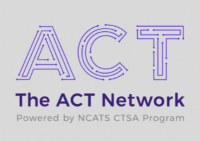Projects
SenNet
The Cellular Senescence Network (SenNet) Program was established to comprehensively identify and characterize the differences in senescent cells across the body, across various states of human health, and across the lifespan. SenNet will provide publicly accessible atlases of senescent cells, the differences among them, and the molecules they secrete, using data collected from multiple human and model organism tissues. To identify and characterize these rare cells, SenNet will develop innovative tools and technologies that build upon previous advances in single cell analysis. Lastly, SenNet aims to unite cellular senescence researchers by developing common terms and classifications for senescent cells.
This work is funded by grant 1U24CA268108-01 from NIH.
The Accrual of patients to Clinical Trials (ACT) network is a nationwide network of sites that share EHR data to significantly increase participant accrual to the nation’s highest priority clinical trials. It is funded by NCATS’ Clinical and Translational Science Awards (CTSA) program that supports efforts to solve system-wide translational research problems to improve the success of U.S. clinical trials. The ACT network is built on existing platforms (i2b2/SHRINE) to create a federated network with common standards, data terminology and shared resources. The ACT investigators are focused on 1) data harmonization across EHR platforms, 2) technical needs assessment and implementation, 3) regulatory approaches to ensure compliance with protocols for data access and participant contact, and 4) governance development to establish proper agreements among institutions. More information is available at NCATS.
This work is funded by grant UL1 TR001857-01S1 from NCATS, NIH.
The Infrastructure Component (IC) of the HuBMAP HIVE, Pittsburgh Supercomputing Center (PSC) and the University of Pittsburgh (Pitt) will create a flexible and scalable hybrid cloud infrastructure in close coordination with the HIVE Collaboratory, the HuBMAP Consortium, and stakeholders world wide. This proposed IC will seamlessly connect HuBMAP with storage and co-located compute resources for depositing, accessing, querying, searching, analyzing, and visualizing both raw and processed HuBMAP data.
This work is funded by grant 1OT2OD026675 from NIH.
PaTH is a Patient Centered Outcomes Research Institute (PCORI) Clinical Data Research Network project which is focused on building a Learning Health System (LHS) for the Mid-Atlantic region. It is comprised of Geisinger Health System, Johns Hopkins University, Johns Hopkins Health System, Penn State College of Medicine, Penn State Milton S. Hershey Medical Center, Temple Health System, Lewis Katz School of Medicine at Temple University, the University of Pittsburgh, UPMC, the University of Utah, and University of Utah Health Care. the University of Pittsburgh leads the informatics component of PaTH.
This work is funded by grant CDRN 1306-04912 from PCORI.
The University of Pittsburgh is funded as one of the Healthcare Provider Organizations for the national All of Us Research Program, which is a historic effort to gather data from 1 million people living in the United States. The goal of the program is to revolutionize how disease is prevented and treated based on individual differences in lifestyle, environment and genetics. The University of Pittsburgh’s program, called the All of Us Pennsylvania Research Program, will enroll 150,000 participants.
This work is funded by grant UG3 OD023153 from the Office of the Director, NIH.
The National Mesothelioma Virtual Bank (NMVB) is a virtual biospecimen registry designed to support and facilitate basic science, clinical, and translational research that will advance understanding of mesothelioma pathophysiology with the goal of expediting the discovery of preventive measures, novel therapeutic interventions, and ultimately, cures for mesothelioma. The current participants in the virtual bank are University of Pittsburgh, University of Pennsylvania, NYU Langone Medical Center, Roswell Park Cancer Institute and University of Maryland.
This work is funded by grant U24 OH010873 from NIOSH, NIH.
BCRF Global Data Hub
The Breast Cancer Research Foundation Global Data Hub is a centralized research portal of breast cancer studies with molecular and clinical data to foster data sharing, analysis, new studies and collaboration.
Faculty Investigator:
Genomic Information Commons (GIC)
The Genomic Information Commons (GIC) is a federated network that is developing two portals for researchers: (A) Prep-to- research portal. Investigators can execute genotype, phenotype, or combined genotype/phenotype queries, and receive aggregate results in real time; and (B) Study portal. With proper approvals, patient-level data are readily transferred to a cloud-hosted environment.
This work is funded by a U01 grant from the NCATS, NIH.
Medication Error Avoidance at Regional Scale (MEARS)
The Medication Error Avoidance at Regional Scale (MEARS) team at the University of Pittsburgh is dedicated to advancing patient safety within the framework of the Jewish Healthcare Foundation’s Regional Autonomous Patient Safety Program (RAPS).
Faculty Investigator:
Models of Infectious Disease Agent Study (MIDAS)
The MIDAS network aims to advance science to improve global preparedness and response against infectious disease threats through research, training, promotion, and service.
Faculty Investigator:
Harry Hochheiser





